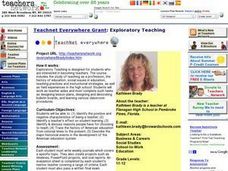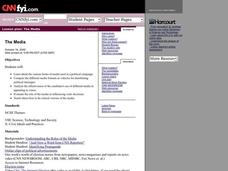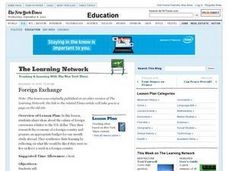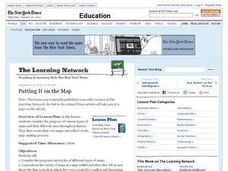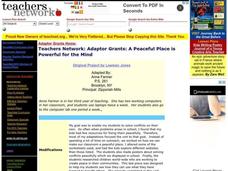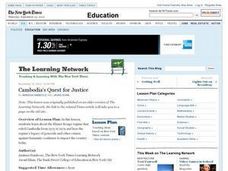Curated OER
Exploratory Teaching
Young scholars participate in an exploratory teaching program. Individually, they identify the positives and negatives of being a teacher and how they effect the students. They use the internet to research the history of the profession...
Curated OER
Americas Idols
Learners engage in a lesson that is concerned with the concept of American Idol and the controversy that surrounds the broadcast. They conduct research using a variety of resources and write paragraphs that state opinions about the...
Curated OER
The Media
Students identify various forms of media used in a political campaign and compare the different formats as vehicles for distributing political messages. They analyze the effectiveness of candidate's uses of different media.
Curated OER
Bench-Pressing Issues
Students examine some of the issues that may be facing the changing United States Supreme Court. With further exploration, they formulate their own opinions and deepen their awareness of these critical topics.
Curated OER
Blowing Through History
Pupils explore hurricanes, consider the damage caused by Hurricane Charley, and research various hurricanes that have hit the United States to create a class guide on these major storms.
Curated OER
When Disaster Strikes
Students examine the ways major industries are affected by and respond to natural disaster. They interview local representatives of these industries on how they prepare for and manage such disasters.
Curated OER
Costs of Living
Learners consider the effects of rising oil and natural gas prices on family spending and saving habits. They design a board game intended to help people save.
Curated OER
Foreign Exchange
Students share ideas about the values of foreign currencies relative to the U.S. dollar. They research the economy of a foreign country and prepare a budget for one month study abroad.
Curated OER
It's Your Move
Learners study about the creation of a German village in South Korea for returning emigrants. They examine other cases of migration and relocation from modern world history.
Curated OER
You Don't Know What You've Got Until It's Found
Students consider what can be learned through the study of artifacts, focusing on those of ancient Egypt. They research famous ancient Egyptian sites to prepare for the development of proposals for exhibits in a fictional museum.
Curated OER
Putting It on the Map
Students consider the purpose of various types of maps and their different uses throughout history. They create their own maps and reflect on the map-making process.
Curated OER
A Peaceful Place is Powerful for the Mind
Learners explore conflict resolution techniques. They develop strong conflict resolution techniques and create a peaceful classroom environment that promotes learning. Students teach others in the community about how to create peace.
Curated OER
Cambodia's Quest for Justice
Students observe pictures, articles, maps, charts and other gathered information concerning the Khmer Rouge regime that ruled Cambodia by participating in a gallery walk. Afterward, they discuss war crimes and the significance of...
Curated OER
Personal Heritage
Fourth graders investigate their personal heritage. For this personal heritage lesson, 4th graders fill in an outline with information about their personal heritage. They create a poster about themselves. This lesson is aimed at...
Curated OER
Economy's Stuck, but Business is Booming at Therapists' Offices
Students explore the concept of the economy and mental health. In this economy and mental health lesson, students read an article about how the mental health community is booming due to the poor economy. Students discuss ways to deal...
Curated OER
Time's Up
How was your year? Create an individual timeline that document learners' personal history from the previous year. After reading an article about celebrating New Year's in Japan, pairs interview each other to gather information about...
Curated OER
Spiraling Through the Guggenheim: Exploring 20th Century Masterpieces
Students experience original works of art through an online tour of the Guggenheim Museum in New York City. They assess the value and unique architecture of the building as well as develop an awareness of its design and relationship to...
Curated OER
Let's Play Scrabble!
What do Alfred Mosher Butts, James Brunot, and Jack Straus have in common? They were all instrumental in the development of Scrabble. Class members will discover these facts and many more as they conduct a WebQuest to gather, organize,...
Curated OER
Creating a School Web Site
Students create websites for their school. They work in groups as a web team and devise a self-management plan. As they work on projects reflecting school life, the team edits what may appear online as the school's web site. Writing...
Curated OER
Splitting the Motherland?
Learners explore issues such as Tibet's struggle for independence and China's invasion in 1950. They create a KWL chart, explore maps of Tibet, and read articles concerning China, the Dalai Lama, and President Bush's relationship to...
Curated OER
Famous Virginians
Fourth graders research the lives of famous people from Virginia. Using the internet, they take notes in a blank flipbook given to them by their teacher. They write a speech in first person of the famous Virginian they researched and...
Curated OER
Welcome Home
Students explore, examine and study about the war in Iraq and consider the problems and concerns faced by injured veterans coming home. They then create questions and conduct interviews with veterans in order to develop proposals for...
Curated OER
Justice Served?
Students familiarize themselves with high-ranking Bush administration officials who have recently resigned and with various elements of political cartoons. THey research the role of the attorney general and the issues that surrounding...
Curated OER
Sudan Surprise
Students consider animal migration patterns that have been recently documented in Sudan. They investigate the migratory patterns of animals and discuss how human conflicts and activities affect migratory wildlife populations.


